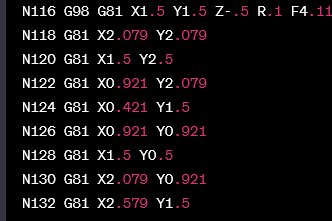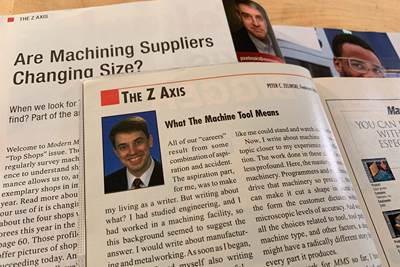The Importance of Modern Machine Shop
Moments of change shine a light on the priorities that have been consistent a long time, and on the worth we carry forward out of a rich past into the future.
Share





CNC machining is digital sculpture. Nothing else like it has ever been invented. A machinist, programmer or engineer can imagine a form, and through the combination of powerful cutting and tiny increments of controlled motion, the form gracefully and precisely takes shape. Over three decades after first seeing a CNC machine tool, I have never stopped loving this.
But let me tell you what else is true about CNC machining. The delivery deadlines for machined parts are tight. The margins can be thin enough for profit to disappear with one critical mistake. And not everyone possesses the combination of mechanical aptitude, mathematical acuity and physical care that machining work requires. Most do not possess this.
CNC machining, the work and the people doing it, need appreciation. This is not a luxury. It is a vital and deserved need for the continued energy, innovation and flourishing of teams and companies producing the hardware on which the modern world is built. And not just appreciation in the form of seeing the beauty as I did above. But also, appreciation expressed through highlighting the special choices and nuances of different shops’ work — noting what is valuable for the benefit of other shops that are busy with their own production, and with the challenges of their own narrow margins.
This appreciation is the role of Modern Machine Shop. This is why the magazine exists, along with the other parts of MMS that fulfill the same mission: events, newsletters, a podcast and more. This role has been consistent since Modern Machine Shop was founded in 1928 (when the appreciation was for machining but not CNC), and certainly since I joined the team in 1997 — and it continues today.
I am stepping into a new role with Gardner Business Media, our parent company, the creator of MMS. As the company’s director of editorial, I will be working across our different editorial teams. Gardner is manufacturing’s media company, with teams of writers and content creators busy reporting for various operational sectors in part production — not just machining, but molding, finishing and more. The aims of my new role have to do with bridging some of the work of these teams, as well as developing coverage in areas of audience interest that touch nearly all our brands but don’t cleanly land in any of them. I hope to be of help.
A little over a decade ago, I also stepped into new role. A few of us then each gave a fraction of time to our then-fledgling efforts to cover a new possibility: making parts through 3D printing. Coverage of this topic has borne fruit and steadily grown, to the extent that Additive Manufacturing Media is now a standalone group within the company. Serving as the lead editor of this group necessitated my stepping out of the role of editor-in-chief of Modern Machine Shop at the start of 2023, when Brent Donaldson took up the role.
With my work for AM Media still growing and the new position with Gardner now beginning, it is time for the next step. After writing a column monthly for the magazine for nearly 24 years, I will end “The Z Axis” as a regular item in Modern Machine Shop. I hope to still post essays for MMS that continue the spirit of this column, but the piece you are reading represents the last installment of the column as a promised part of every issue.
In coming to this point of decision about my work for Gardner and how to succeed in the next season of it, I find myself thinking of a man whose own career with the company recently, successfully concluded.
Tom Beard was editor-in-chief of MMS from 1992 to 2000. He retired from Gardner Business Media just last year. My own column began in 2000 around the time when he stepped out of MMS for a different role with the company.
Tom was (and is) an encourager. And a realist. To balance these two modes, he would often begin statements of objection using the phrase, “It strikes me that….” I think he still occasionally does this. It is a buffering phrase, a way of giving criticism without inflicting it. The criticism, after all, is just in the air — it is striking him. We are being struck by it together.
Similarly, Tom made a habit of praise. When he and I worked on MMS together, the latest issue would arrive, and he would come to my desk with it in his hand to make sure I knew what I had done right or well within it. And in at least one case, he also taught me about holding a line. I listened to his side of a phone call with a party asking for something we couldn’t agree to, and I understood.
In all these ways, Tom modeled for me how to protect and support creative people as they try to find their way, and even try to get out of their own way. And there is a direct line here. The director role I am taking up will multiply my chances to lend aid and sustenance to creators, some of whom will speak confidently to manufacturing in a future far beyond this moment. I will no doubt be putting to use some of what I learned from Tom.
One other thing: he hired me. It was over a quarter century ago, but he is the one who composed and sent the offer letter I still have in my files.
So here is where I want to end, with gratitude. Thank you, Gardner Business Media, for all the ongoing opportunity, including this latest one. Thank you, Modern Machine Shop, for the work you keep doing to build up manufacturing and machining. I began this piece with MMS’s importance to industry; I end with a heart full of how important it has been to me. Thank you, Tom Beard, for the job.
Read Next
Can AI Replace Programmers? Writers Face a Similar Question
The answer is the same in both cases. Artificial intelligence performs sophisticated tasks, but falls short of delivering on the fullness of what the work entails.
Read More20 Years of “The Z Axis”
Peter Zelinski notes the 20-year anniversary of his monthly column for Modern Machine Shop, offering reflections on writing this column for machining leaders and professionals over the span of two decades.
Read MoreBuilding Out a Foundation for Student Machinists
Autodesk and Haas have teamed up to produce an introductory course for students that covers the basics of CAD, CAM and CNC while providing them with a portfolio part.
Read More


















.png;maxWidth=300;quality=90)







